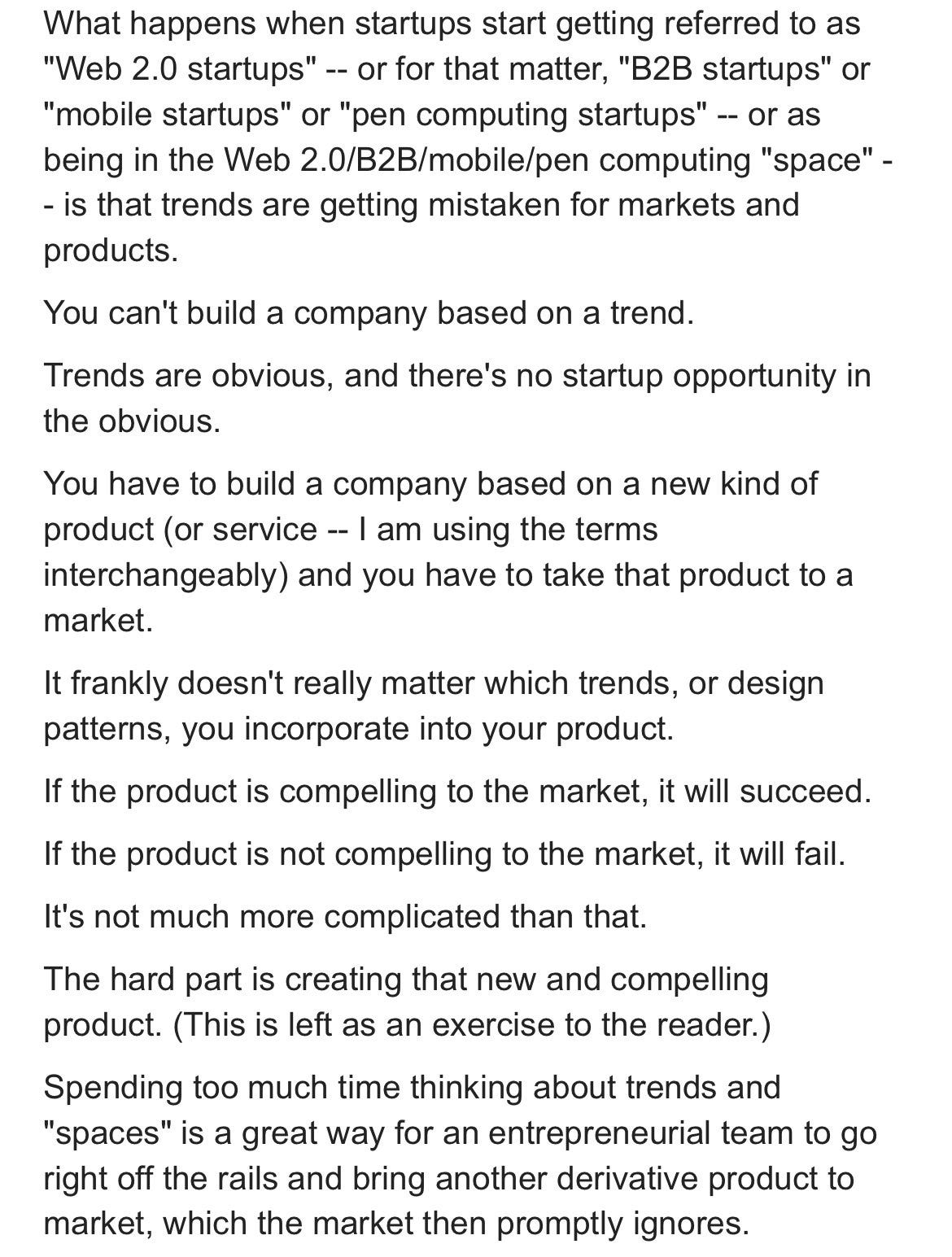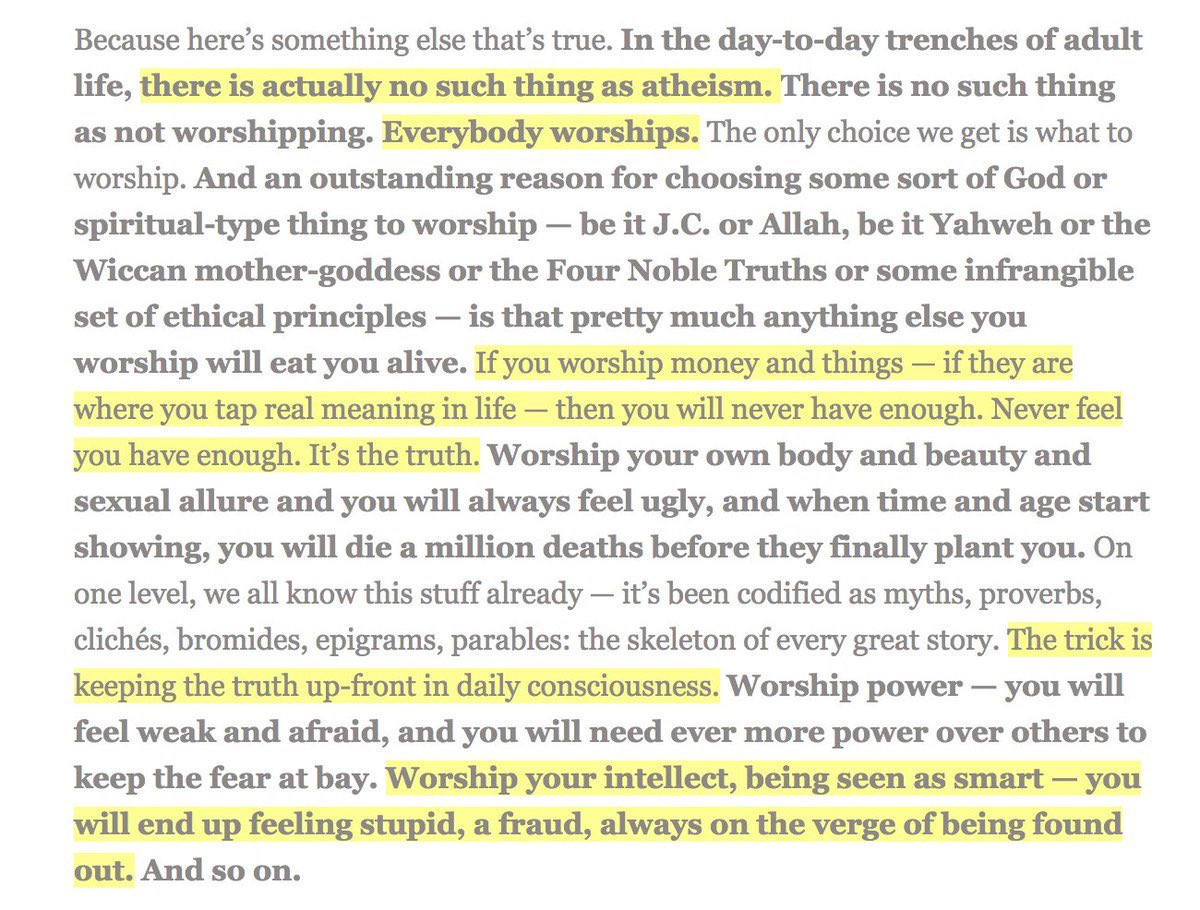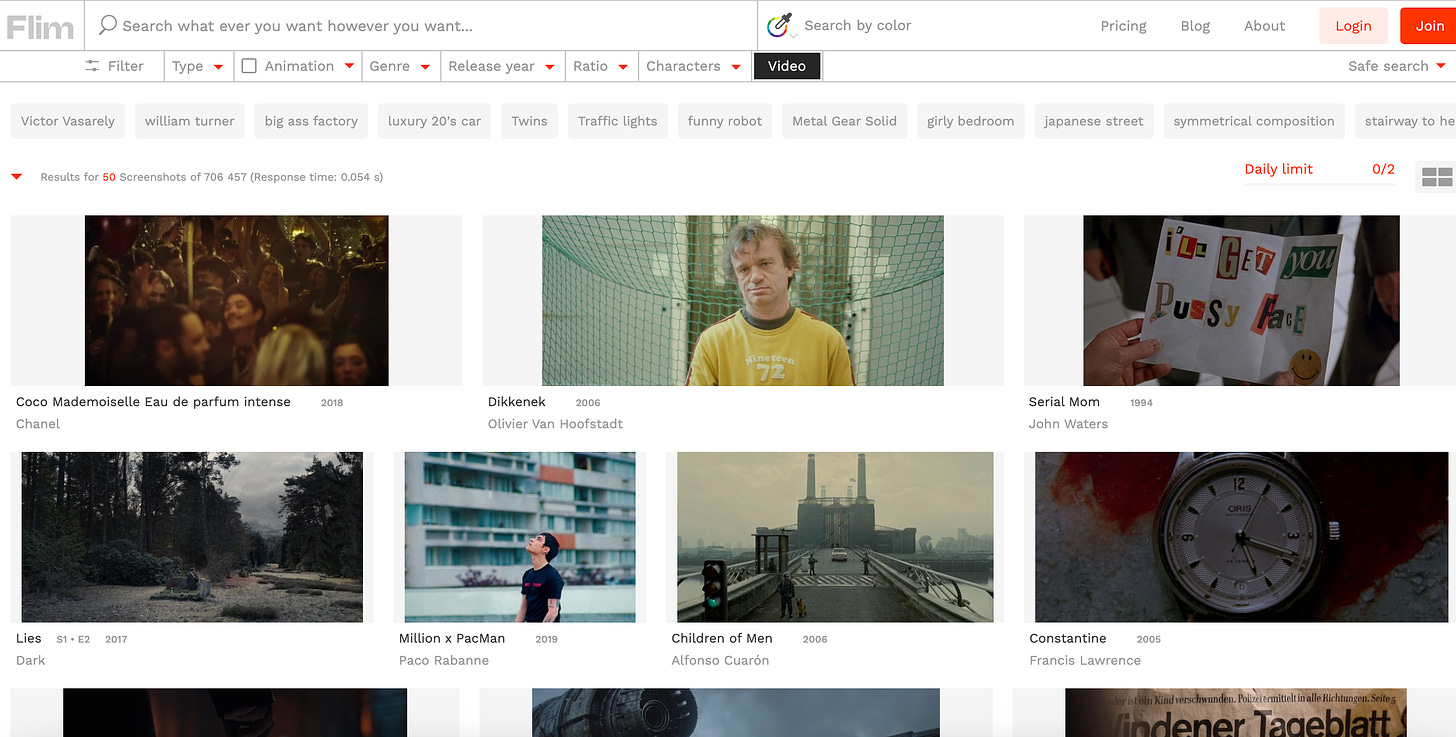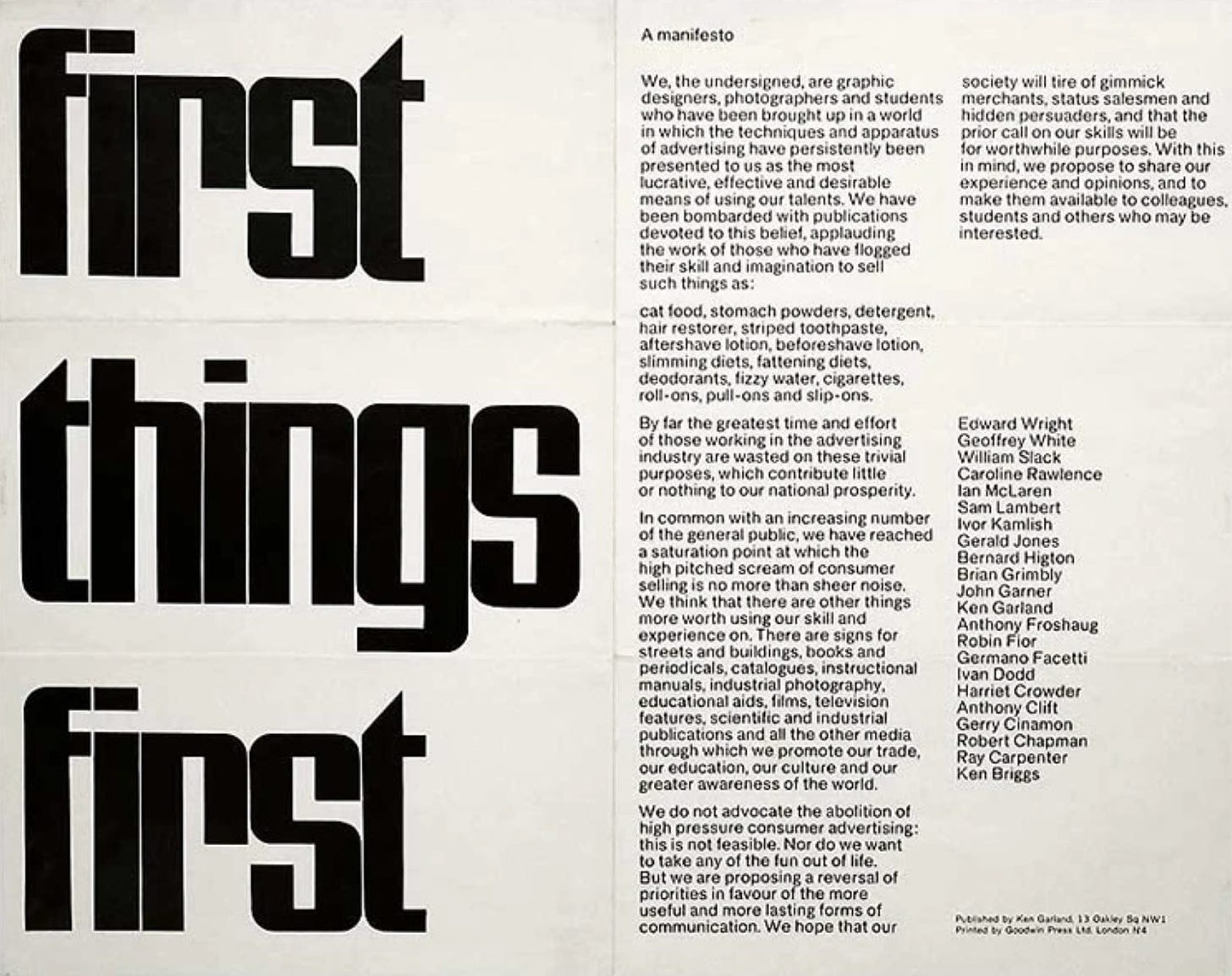Hi, I’m Sari Azout and this is the startupy newsletter, where I share an eclectic assortment of links, thoughts, and ideas curated in and around the startupy universe. Join me down the rabbit hole.
Here are this week's 10 cool things:
1
TIMELY ADVICE FOR BUILDERS
or why “I’m building an AI startup” is not going to cut it.
👁️ Curated in startup advice
2
WHY ADVERTISING?
Here’s an incredible stat: Meta makes $207 per year per user in the US and Canada, without charging them anything. That's more than many consumer subscription products (Netflix, Spotify, etc) make from their paid users.
What’s most surprising is that ad spend as a percentage of GDP has stayed fairly constant over the past century (between 1-1.4%) while other industries have seen much wider fluctuations (for example: food was 35% in 1930s vs 13.5% today).
What explains then, the fact that two of the largest companies in the world (Alphabet and Meta) are in the business of selling ads?
Byrne Hobart has a good analysis on the topic, but one explanation I find compelling is that today, there is more diversity in products people could want, creating a more challenging problem matching supply to demand (and creating more rewards for matching them).
👁️ Curated in why advertising?
3
SOCIAL MEDIA IS A PLACE TO PERFORM, NOT A PLACE TO COMMUNICATE
On my mind: Social media makes more sense when you view it as a place people go to perform rather than a place to communicate.
There's a big difference between sharing to elicit a reaction, and building an archive for yourself that you’re comfortable sharing with others.
Most social networks are the equivalent of opening your door and shouting at your neighbors (narcissistic).
Private note-taking tools are the equivalent of shutting your door (lonely).
We need more spaces on the Internet that feel like quietly leaving the door open and inviting opportunities for serendipity.
Social media needs new vibes. Fall down these rabbit holes with me → on information, social media, dreaming of a better internet, algorithmic anxiety
4
THERE IS NO SUCH THING AS NOT WORSHIPPING
5
THE BEST EMAIL SIGNATURE I’VE EVER SEEN
”It’s normal for me to take 2 days to read my emails and 2 more days to reflect on the matter and respond calmly. The culture of immediacy and the constant fragmentation of time are not very compatible with the kind of life I lead”
via Lucy Hunt
6
A SEARCH ENGINE FOR CREATIVE PEOPLE
Flim.ai is a great example of a boutique search engine. Search thousands of movie stills/screenshots, powered by AI. What a gem!
7
THE TYRANNY OF CONVENIENCE
I’m loathe to admit that I feel a damned compulsion to make efficient use of every second of my life, which is why this essay on what we lose when we optimize for convenience feels especially personal.
Today’s cult of convenience fails to acknowledge that difficulty is a constitutive feature of human experience. Convenience is all destination and no journey. But climbing a mountain is different from taking the tram to the top, even if you end up at the same place. We are becoming people who care mainly or only about outcomes. We are at risk of making most of our life experiences a series of trolley rides.
Created to free us, convenience can become a constraint on what we are willing to do, and thus in a subtle way it can enslave us.
Pair with this essay by Freddie DeBoer, a beautiful meditation on the things we mistake for progress:
All across our culture, you’ll find people eager to abandon the fundamental task of our lives, fostering and maintaining human connection, so that they can fall deeper into a pit of hedonistic distraction forever. You send an email a large language model wrote for you to spare yourself a minute of mental activity at the end of a long day working from home driven by Adderall you got via Zoom from a pill-mill doctor, you order dinner through an app (so that you don’t have to talk to an actual person on the phone), masturbate to online porn, watch several dozen videos on YouTube, none of which you’ll remember even three days later, then take two Xanax to put yourself to sleep. That’s progress now, the steady accumulation of various tools to avoid other human beings, leaving people free to consume #content that is by design totally, existentially disposable, throw-away culture that asks nothing of us and which we don’t remember because neither creator nor audience wants to invest enough for remembering to make sense.
It would be perverse to embrace inconvenience as a general rule. But we should ask ourselves what we surrender when we let convenience decide what we collectively build and value.
👁️ Curated in intangible value
8
I LIKE THIS DEFINITION OF SUCCESS
“For me, success is not a public thing. It’s a private thing. It’s when you have fewer and fewer regrets.” - Toni Morrison
👁️ Curated in success
9
THE NEW IS NOT NEW
I love discovering fragments from the past that remind us that the challenges we face today are not unique to our time. Here’s two examples:
We assume in some hypothetical past attention wasn’t scarce and we didn’t suffer from too much information. But before the information age people still complained about too much information. Here’s a look at news headlines between 1881 and 1937.
My favorite example is this manifesto from 1964, where a group of designers lashed out on the trivial demands of mainstream advertising. This feels like something written by Facebook designers in 2023.
10
BONUS: LET’S TALK ABOUT MONEY!
We live in a world where we feel ashamed for not having money, guilty for having it, and confused about when it's okay to have a conversation about it.
Our next community rabbit hole sesh will explore our complicated relationship with money.
For more deets and to RSVP, click here. (spaces are limited)
Curator spotlight
REZA SAEEDI
Growth at OnDeck
outofcuriosity.substack.com
twitter.com/rezsaeedi
DOWN THE PERSONAL KNOWLEDGE MANAGEMENT 🐇🕳️
Why is Personal Knowledge Management (PKM) interesting?
Having a smooth storage system for highlights and notes is crucial for me when reading books/articles, or listening to podcasts. It helps me effectively review and distill valuable insights later on. Without it, I feel like I'm not retaining anything.
To me, this is the essence of PKM: a framework for not only effectively capturing the information we consume from different sources on a daily basis, but also leveraging that for future research, learning, and ultimately shipping our best work. PKM is not just about collecting and organizing information. It is also about reflecting on our learning, evaluating the quality of information, and actively seeking new knowledge.
A podcast worth listening to on the topic?
The Cortex Podcast does a good job of covering topics related to productivity frameworks, workflows, and PKM. The hosts share their own experiences with managing their personal knowledge and discuss different strategies for staying organized and efficient.
Things worth reading and watching on the topic?
📚️ Building a Second Brain — This is a good distillation of Tiago Forte's philosophy to effectively capture, organize, and retrieve information for personal and professional growth.
📰 Wondretools is an exceptional newsletter that thoroughly (and critically) explores various tools for thought and workflows.
📝 The End of Organizing (Dan Shipper) — This article's take on the next generation of note-taking tools really resonated with me. In Dan's words, "Organizing is going to become unnecessary because no one actually wants to go back and look at their old notes. What you really want is the information in your notes, synthesized and presented to you at the right place and at the right time."
📺️ I love the simplicity and clarity of what Shu Omi shares on his YouTube channel. I've really enjoyed following his journey over the last 3 years and observing how his approach to different workflows, tools and methods has evolved.
Projects worth following on the topic
Readwise is the central piece of my PKM system when it comes to organizing and distilling highlights and notes. It's also very well integrated with other tools in the space. They also recently released Reader as their read-later arm (similar to Pocket/Instapaper).
Napkin analyzes your notes and shows you related ideas, constantly opening up new perspectives and idea combinations. Two things that makes me excited about Napkin: 1/ The serendipity that it brings to my workflow, resurfacing ideas that I had previously collected (and might've forgotten about), and 2/ The auto-tagging capability that makes finding highlights a breeze.
Thank you so much for being a part of this work. You can find us in these other online portals:
☼ Twitter
☼ Instagram
☼ Spotify
☼ Startupy
☼ Search the startupy hivemind using AI









lovely curation!